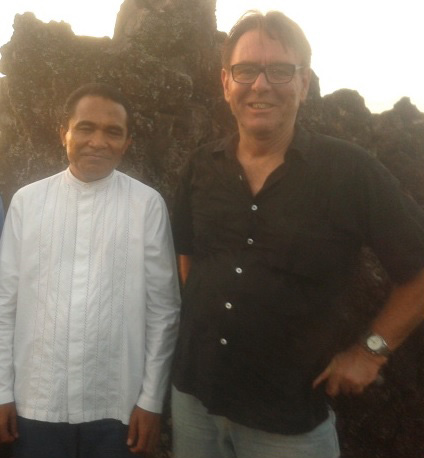新任スタッフ紹介 42
Biography

BOWDEN, Frederick John
(2015年9月外国人研究員着任)
My name is John Bowden and I arrived at TUFS on 1 September 2015, and plan to be here until the end of March. I did my Bachelors and my Master’s degrees in Linguistics at the University of Auckland in New Zealand. In 1992 I went to the University of Melbourne to undertake a PhD in Linguistics. While growing up in New Zealand I started to take an interest in the languages of the Pacific and arrived in Melbourne expecting to write a grammar of an undescribed Oceanic language for my thesis. However, the practicalities of obtaining a visa meant that I took a detour into eastern Indonesia and worked instead on Taba, spoken in the Halmahera region of North Maluku province, and a member of the sister subgroup to Oceanic where little research had been done at that time.
Over the years since I was first employed as a post doctoral fellow at the Max Planck Institute for Psycholinguistics, and then for about 10 years as a research fellow in Linguistics at the Australian National University. For the last six years I have been working as the local director of the Jakarta Field Station of the Linguistics Department at the Max Planck Institute for Evolutionary Anthropology. Most of my work has remained focused on eastern Indonesia and East Timor, where I have continued to work on a variety of Austronesian and non-Austronesian languages. My most recent project was with fellow researchers from the Lembaga Ilmu Pengetahuan Indonesia (LIPI – the Indonesian Institute of Science) where I worked on a project to document Gamkonora, a Papuan language from Halmahera.
I, like many other linguists, have developed an interest in the lingua francas spoken in the areas I have done fieldwork. In the past I have published on North Maluku Malay, while more recently I have become interested in colloquial Jakarta Indonesian, which will be the focus of my research at ILCAA. Like many other varieties of colloquial Malay, Jakarta Indonesian has what might be called a very loose grammar with few hard and fast rules about obligatory word order, and a weak distinction between nouns and verbs etc. I have recently published work with colleagues Thomas Conners and David Gil from Jakarta, looking at typical argument patterns with a range of different verbal meanings in Colloquial Jakarta Indonesian (CJI) conversations. If we take the example of the verb suka ‘to like’ and look at how it combines with a liker and a stimulus we find all six logical possibilities of ordering represented in the data, along with a range of other alternative realisations where either the liker, the stimulus or both are omitted. While CJI seems to be very promiscuous in how it allows different arguments to be expressed or not, not each of the possible orderings are equally represented in the data. Some orderings are much more frequent than others. During my research at ILCAA, I plan to work with the same data, using insights from the theory of Information Structure in an attempt to see how speakers of Jakarta Indonesian make choices between the possible ordering of elements, and how listeners interpret the different realisations of clauses in actual conversational discourse.
Selected publications
- Bowden, John. 1993. Behind the preposition: the grammaticalisation of locatives in Oceanic languages. Canberra: Pacific Linguistics.
- Bowden, John. 2001. Taba: description of a South Halmahera language. Canberra: Pacific Linguistics.
- Bowden, John. 2002. ‘Taba and Malay: a type of incipient language death or the incipient death of a language type?’ in David Bradley and Maya Bradley, eds. Language endangerment and language revival: an active approach, 114-143. London: Curzon Press.
- Bowden, John. 2012. ‘Local languages, local Malay and Bahasa Indonesia: a case study from North Maluku.’ n analysis of linguistic structure, culture and identity through the prism of the North Maluku Malay directional system’. In Wacana (14.2): 312-332. Documentation of Nusantara Cultures.
- Conners, Thomas, John Bowden and David Gil. 2015.’ Valency classes in Jakarta Indonesian.’ In Andrej Malchukov and Bernard Comrie. eds. Valency Classes in the World’s Languages, 941-986. Berlin: De Gruyter Mouton.
Caption for photograph: With Gufran Ali Ibrahim (Rektor of Universitas Khairun, Ternate) in Ternate, eastern Indonesia.
Copyright © 2010 Research Institute for Languages and Cultures of Asia and Africa. All Rights Reserved.
